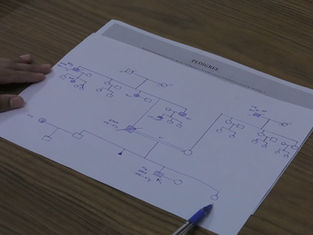
Research Overview
The Rohini Nilekani Centre for Brain and Mind tackles the global challenge of psychiatric disorders with a pioneering study focusing on high-risk families. Clinical investigations, including neuroimaging and neuropsychological assessments, are conducted on these cohorts regularly. Through our collaborations with NCBS, patient blood samples are used to establish disease-specific cellular models using immortalised cell lines and induced pluripotent stem cells (iPSCs).
By analysing these patient-derived cell lines through genetic studies & cell-based assays, alongside large-scale clinical data, our research aims to unravel the complex relationship between cellular phenotypes and psychiatric disorder progression. This interdisciplinary approach promises to advance our understanding and facilitate the development of innovative therapies, ultimately improving mental health outcomes.

Clinical Assessments
Our clinicians conduct comprehensive evaluations of patients’ behaviours and symptoms. This is followed by a psychiatric screening that assesses family history, charts hereditary traits & measures the severity of the disorder. Neuropsychological tests evaluate cognitive skills in individuals with & without psychiatric disorders, considering their family history

Genetic Studies
We assess changes in DNA sequence in psychiatric patients, their immediate relatives & in unrelated controls (people without a psychiatric diagnosis). Understanding why & how these changes happen can help scientists understand how genetic risk translates to disease.

Multimodal Neuroimaging
We use imaging techniques such as eye-movement tracking, functional near-infrared spectroscopy, MRIs and EEGs. These help us evaluate the structural changes in the brain & its activity linked to psychiatric diseases.

Bioinformatics
Using powerful computers, we study differences in the DNA of individuals with & without psychiatric disorders in different populations. This genetic information helps us find the cause & predict the chances of developing these psychiatric disorders.

Stem Cell Research
Stem cells, developed from blood cells, are used to investigate differences in brain cells during disease. We study whether these cells function differently than those of non-affected people.






%201.png)


%201.png)



%201.png)



%201.png)

